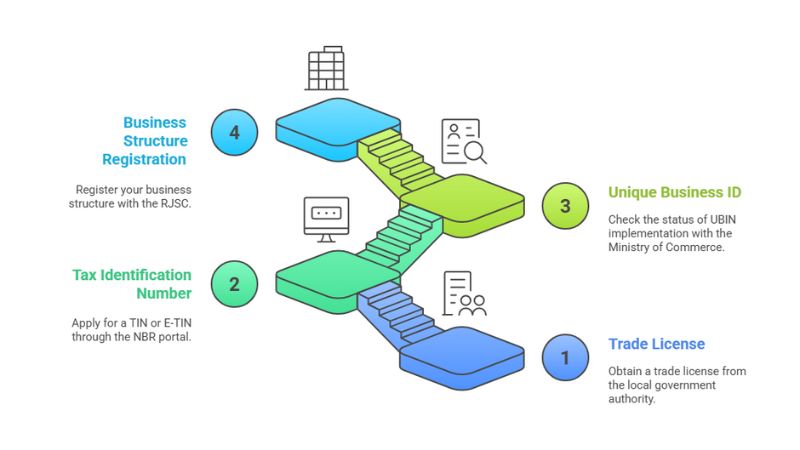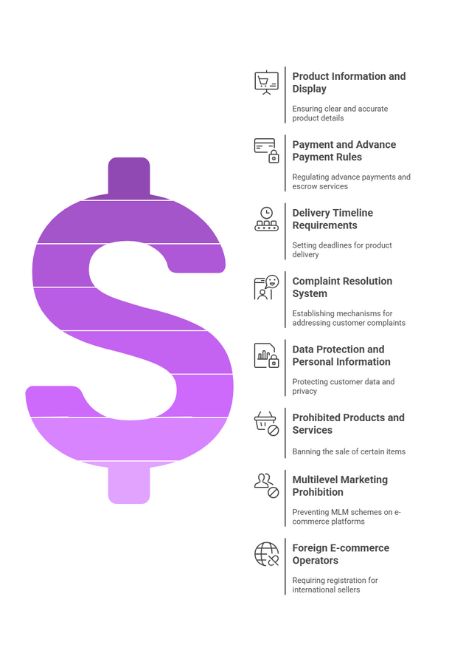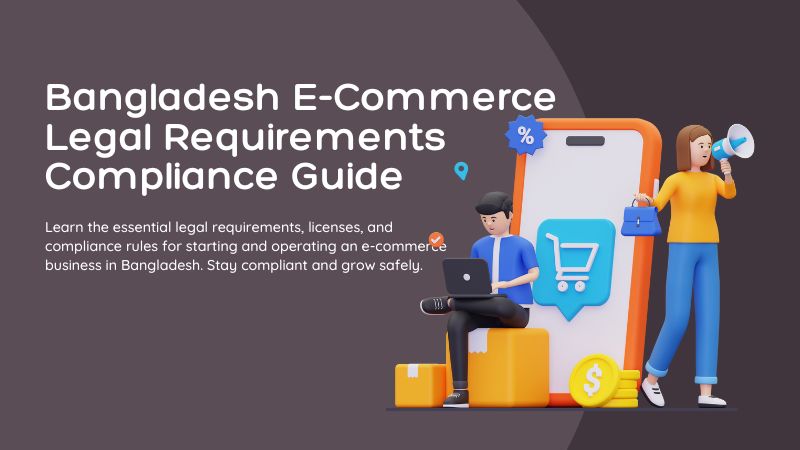Running an e-commerce business in Bangladesh isn’t just about having a website and accepting payments. There’s a growing legal framework that every online seller needs to understand. Ignoring these requirements could result in fines, business closure, or legal action.
This guide walks you through the actual legal requirements and compliance obligations you need to follow to operate legally and protect your business.
The Legal Foundation: Key Laws Governing E-commerce in Bangladesh
Bangladesh has developed a comprehensive legal framework to regulate digital commerce. Understanding these laws is essential for compliance.
The National Digital Commerce Policy, 2018
The government issued the National Digital Commerce Policy of 2018 to facilitate development through a joint partnership with the public and private sectors and to protect consumer rights through cooperation. The policy has created accountability in digital commerce operations by ensuring enhanced transparency in digital business practices.
The Digital Commerce Operational Guidelines, 2021
This is the most important regulation you need to know about. On 4 July, 2021 the Ministry of Commerce issued the Digital Commerce Operation Guidelines, 2021 pursuant to the National Digital Commerce Policy, 2018 (as amended in 2020) with the aim of ensuring transparency and accountability in the digital commerce sector, creating employment opportunities, ensuring the rights of the consumers and increasing the reliance on digital commerce by bringing about a regulatory framework.
The Consumer Rights Protection Act, 2009
The Consumers’ Rights Protection Act, 2009, remains the primary legislation for consumer protection.
This Act applies to all businesses, including e-commerce, and establishes consumer protection mechanisms that you must follow.
The Digital Security Act, 2018 (Now Cyber Security Act, 2023)
The Digital Security Act 2018 has provisions for the establishment of the Digital Security Agency and punishments for forgery and fraud with the use of computers.
This is critical for protecting customer data and preventing cyber fraud.
The ICT Act, 2006
The ICT Act of 2006 was the legal foundation for digital transactions in Bangladesh and the formation of a complex e-government network that supports e-commerce development. The ICT Act also recognizes online contracts and digital signatures, and provides for dispute resolution mechanisms.
Business Registration and Licensing Requirements

Before you can legally sell online, you need to complete several registration steps. Here’s what’s mandatory:
1. Trade License
Every digital commerce business must obtain a trade license from its local government authority. Every DCB has to have a trade licence. Mahbub-law This is non-negotiable – even if you’re selling on Facebook or Instagram.
Where to apply: Your local City Corporation, Cantonment Board, Pourashava, or Union Parishad, depending on your location.
Process: Visit the local government office with your business details, address proof, and identification documents.
2. Tax Identification Number (TIN) or E-TIN
A Tax Identification Number (TIN) is another essential requirement for any business. It allows the government to track the income and taxation details of businesses operating within Bangladesh. The National Board of Revenue (NBR) issues TINs, and the application can be completed online via the NBR portal. TINs are vital for complying with the country’s taxation rules as established by the Income Tax Ordinance, 1984.
How to apply for E-TIN:
Visit the NBR portal: https://secure.incometax.gov.bd/TINHome
To successfully apply for a company TIN via the online portal, you’ll need: the Company’s registered name (as per RJSC registration), the Incorporation number and date (obtained from the Registrar of Joint Stock Companies and Firms), Registered address of the company, Name of the authorised person, a unique mobile phone number, and also a valid email address.
Upon final submission, the NBR system automatically processes the information and instantly generates the TIN certificate (e-TIN). The e-TIN certificate becomes available for immediate download and printing directly from the portal.
Source: Resource Portal
3. Unique Business Identification Number (UBIN)
Under the Guidelines, steps are to be taken so that all digital commerce platforms are gradually required to obtain a Unique Business Identification Number (UBID).
This is being rolled out in phases, so check with the Ministry of Commerce for current implementation status.
4. Business Structure Registration
Depending on how you structure your business – sole proprietorship, partnership, or private limited company – you may need to register with the Registrar of Joint Stock Companies and Firms (RJSC).
For Private Limited Companies: Private limited companies, irrespective of whether foreign or locally owned, must apply for a TIN Certificate.
Source: ResearchGate
Key Compliance Requirements Under Digital Commerce Guidelines

The 2021 Digital Commerce Guidelines establish specific rules you must follow. Here’s what’s mandatory:
Product Information and Display Requirements
Product information must be displayed clearly. In the marketplace or Facebook page used for purchasing and selling, refunds, return of goods, replacement of goods, method of delivery, delivery time, and other conditions must be listed in Bangla and presented in a clear manner. The conditions can be listed in another language in addition to Bangla.
What this means for you:
- Product descriptions must be accurate and detailed
- Price must be clearly displayed
- All terms and conditions must be in the Bangla language (English can be additional)
- Your return and refund policies must be clearly stated
Source: Mahbub-law
Payment and Advance Payment Rules
There are strict rules about accepting advance payments:
100% advance payments can be taken only for goods that are ‘ready to ship’. If the good is out of stock (meaning you cannot hand it over to the delivery man within 48 hours from the time of payment), then you cannot take more than a 10 percent advance payment for that item.
The only exception is if you use an escrow service system approved by the Bangladesh Bank. In that case, you can still take a 100 percent advance payment.
What this means: If you don’t have items in stock, you can’t take more than 10% advance payment unless you use an escrow service approved by Bangladesh Bank.
Delivery Timeline Requirements
Products delivered within the same city should be made within 5 days if payment is made, and if delivered in a different city, it shall be delivered within 10 days. For goods of regular use or perishable goods, the delivery shall be sooner, and the buyer must be made aware of the same.
These are hard deadlines you must meet:
- Same city delivery: Maximum 5 days
- Different city delivery: Maximum 10 days
- Perishable goods: Must be delivered sooner
Source: The Daily Star
Complaint Resolution System
The marketplace must maintain a system for addressing complaints, and the relevant app or platform should clearly state the phone number, email address, or any other method through which complaints can be submitted. Every DCB has to have a compliance officer who will coordinate with the Department of Consumer Rights. A record of the complaints should be kept, and any solution to the problem should be communicated to the client within 72 hours through phone, email, or sms.
You must have:
- A designated compliance officer
- Clear contact channels for complaints
- A system to resolve complaints within 72 hours
- Records of all complaints
Data Protection and Personal Information
Digital commerce platforms are required to obtain prior permission from the buyer before collecting any personal data. They must clearly explain the reason for collecting the data, where the data will be stored, how it will be processed, and the purposes for which it will be used.
Your obligations:
- Get explicit customer consent before collecting data
- Clearly state why you’re collecting data
- Tell customers where data will be stored
- Explain how data will be used
- Keep all business information for at least 6 years
Prohibited Products and Services
No addictive or prohibited substance may be sold on digital commerce platforms; no arrangement for online betting or online gambling may be made; no lottery or raffle draw may be made in contravention of the existing provisions. No digital commerce platform may sell medicines or health care products without an appropriate license from the Directorate General of Drug Administration.
You cannot sell:
- Drugs or addictive substances (unless licensed)
- Alcoholic beverages
- Explosives or prohibited items
- Medicines or medical products (without Drug Administration license)
- Offer gambling or betting services
- Run lotteries or raffles without approval
Multilevel Marketing Prohibition
Multilevel marketing (MLM) or Network Businesses cannot be managed through DC or E-commerce.
This is a complete prohibition. You cannot use e-commerce platforms for any MLM schemes.
Foreign E-commerce Operators
All foreign digital commerce platforms conducting business in Bangladesh must be registered in the country and obtain the necessary approvals from the relevant authorities.
If you’re an international seller operating in Bangladesh, you must register locally and get approvals from the relevant ministries.
Consumer Rights Under Bangladesh Law
Understanding what consumer rights you must protect is crucial. Here’s what the law requires:
The Consumers’ Rights Protection Act, 2009, remains the primary legislation for consumer protection. Key consumer rights include: the right to safety, the right to be informed, the right to choose, and the right to be heard. RSIS International
Product Safety and Quality
As a consumer in Bangladesh, you have the right to receive goods that are safe, free from defects, and conform to the standards advertised by the seller. Product Safety: The law ensures that products you buy are free from hazards that could harm your health or safety. If a product is found to be unsafe, you have the right to return it and demand a refund or replacement. Lexfex
You must ensure:
- All products are safe and free from defects
- Products match the description you provided
- Products meet advertised standards
- No expired goods are sold
Refund and Return Rights
When you purchase a product in Bangladesh, you have the right to return, replace, or receive a refund for goods that are defective, damaged, or do not match the description given at the time of purchase. If a product is damaged, faulty, or doesn’t work as expected, you are entitled to a refund or replacement.
You must have a clear refund policy allowing returns for defective or misrepresented products.
Information and Disclosure Requirements
As a consumer, you are entitled to fair treatment during any transaction, and you should not face unfair or deceptive practices from businesses. Consumers in Bangladesh have the right to be fully informed about the products and services that they purchase. This includes clear and accurate information about the price, quality, ingredients, and any potential risks related to a product. Lexfex
Your obligations:
- Provide accurate product information
- Disclose pricing clearly
- Explain any risks or warnings
- Don’t use false advertising
- Display proper labeling with ingredients and origin
Liability for Non-Compliance
Failing to comply with these regulations can result in serious consequences.
If a product is found to be unsafe or defective, businesses can face penalties. If it becomes impossible to supply the goods to the consumer who paid the full price due to an unforeseen circumstance, the business must be informed within 48 hours, and a full refund must be made within the next 72 hours. Expired goods cannot be sold or supplied. No fake or adulterated goods can be displayed or sold.
Potential penalties include:
- Business closure (temporary or permanent)
- Fines
- Legal action
- Criminal charges for fraud or misrepresentation
- Loss of business license
Special Requirements for Specific Product Categories
Medicines and Healthcare Products
No digital commerce platform may sell medicines or health care products without an appropriate license from the Directorate General of Drug Administration.
If you want to sell medicines or health products, you must:
- Apply to the Directorate General of Drug Administration
- Obtain the appropriate license
- Follow all pharmaceutical regulations
Directorate General of Drug Administration: https://dgda.gov.bd/
Payment Methods and Digital Wallets
No digital wallet, gift card, cash voucher, or other alternative payment method may be implemented without the permission of the Bangladesh Bank (where applicable) or in contravention of the Bangladesh Bank’s directions.
If you want to create custom payment methods, vouchers, or gift cards, you must get Bangladesh Bank approval first.
Bangladesh Bank: https://www.bb.org.bd/
Intellectual Property and Content Rights
Intellectual property infringement and digital exploitation are prevalent risks in e-commerce. Counselslaw You must ensure that all products, images, descriptions, and content you use don’t infringe on others’ intellectual property rights.
Applicable laws:
- Copyright Act, 2000
- Patent and Design Act, 1911
- Trademarks Act, 2009
- Geographical Indication (Registration and Protection) Act, 2013
Data Retention Requirements
All the information relating to the business shall be preserved for at least 6 years and shall be provided to any government entity upon demand.
You must keep records of all transactions, customer communications, complaints, and business information for at least 6 years for government inspection.
How to Ensure Compliance: A Practical Checklist
To make sure you’re compliant, here’s what you need to do:
Registration and Licensing:
- Obtain a trade license from the local government
- Apply for TIN/E-TIN from NBR (https://secure.incometax.gov.bd/TINHome)
- Apply for UBIN as it becomes mandatory in your area
- Register your business structure if you have a company
Business Operations:
- Have a compliance officer designated
- Display all product information in Bangla
- Show clear pricing and charges
- State refund, return, and replacement policies clearly
- Ensure 5-day (same city) or 10-day (different city) delivery timelines
- Don’t accept more than 10% advance for out-of-stock items (unless using escrow)
- Maintain a complaint resolution system with a 72-hour response time
- Keep all business records for 6 years
- Get customer consent before collecting data
Product Compliance:
- Don’t sell prohibited items
- If selling medicines, get a Drug Administration license
- Ensure all products are safe and match descriptions
- Don’t sell expired goods
- Verify intellectual property compliance
Payment:
- Only use approved payment methods
- Get Bangladesh Bank approval for custom payment solutions
- Maintain secure payment processing
Getting Professional Help
If you’re unsure about specific requirements, consult a legal professional. With the rapid Bangladesh E-commerce Market Growth: What Business Owners Need to Know, staying updated on regulations and trends has become even more important for long-term success.
Organizations that can help:
- Local tax office (for TIN registration)
- Ministry of Commerce (for digital commerce inquiries)
- Directorate General of Drug Administration (if selling medicines)
- Bangladesh Bank (for payment method approvals)
- Local business registration offices (for trade license)
Read More: E-commerce Websites in Bangladesh: Best Practices & Tools
The Bottom Line
Operating an e-commerce business in Bangladesh legally is not optional – it is mandatory. The government has clear regulations to protect consumers and ensure fair business practices.
The good news is that these requirements are manageable. The key is understanding them early and building compliance into your operations. Start with the basics: get your trade license, apply for your TIN, understand the Digital Commerce Guidelines, set up proper complaint resolution, and keep good records.
Most successful e-commerce businesses in Bangladesh follow these rules not only to avoid penalties, but also because compliance builds customer trust. When customers see that you are registered, licensed, and following the rules, they feel more confident buying from you.
The Bangladesh e-commerce market is growing fast. But growth without compliance can create problems. Invest the time now to handle the legal side correctly, and you will build a business that lasts.
